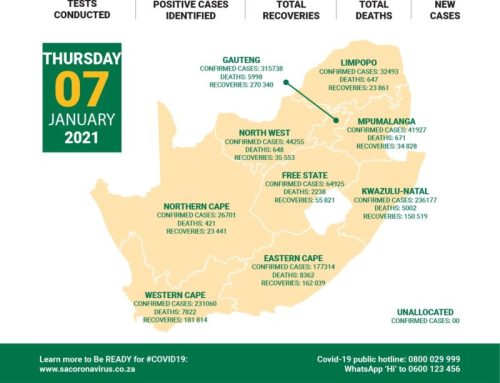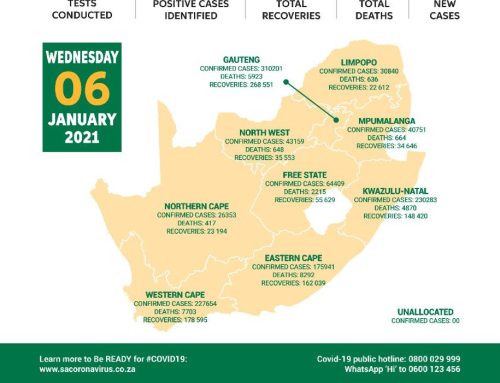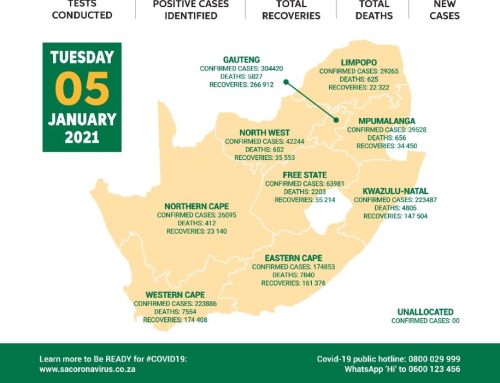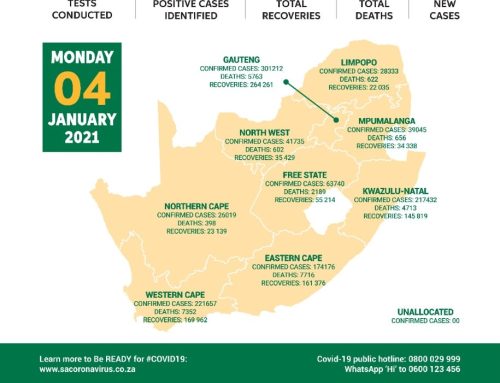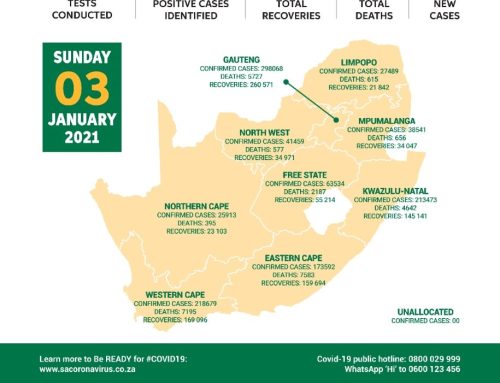24 March 2020
We address you this morning, after having received a clear, detailed and carefully considered address by President Ramaphosa. The President stated “We must do everything within our means to reduce the overall number of infections and to delay the spread of infection over a long period – this is known as flattening the curve of infection”.
From a health perspective what does this mean:
Before dealing with further details, I must announce to South Africans that as of today, the confirmed cases of COVID-19 in South Africa have risen by 152. This brings the total number of confirmed cases to 554.
The Provincial breakdown is as follows:
| Gauteng | 302 |
| Western Cape | 113 |
| KwaZulu Natal | 80 |
| Free State | 18 |
| North West | 5 |
| Mpumalanga | 9 |
| Limpopo | 4 |
| Northern Cape | 2 |
| Eastern Cape | 2 |
Cases that are not allocated per province are at 19.
As of yesterday, 23 March 2020, South Africa had conducted 12 815 tests for COVID-19. 10 803 of these were done in private laboratories and 2012 have been done by public laboratories.
South Africans would have noted that as the number of confirmed cases increase, some cases were unallocated by province, age or gender. This is because the NICD not only has the responsibility of analysing data from each laboratory, but has found itself searching for the missing patient information of the confirmed cases.
This has proven to be an administrative burden that, if not rectified, will hamper our efforts to immediately be in contact with patients who have tested positive, determine whether they require hospitalisation or can be treated in self-quarantine and more importantly trace all other individuals that they have been in direct contact with.
This is the only way we can flatten the curve: We must know every individual that has been exposed, they must be immediately screened and those that require testing, must be tested without any delay while they remain in self – quarantine. If those contacts test positive, we must further identify their contacts because they also become potential positive cases.
Simply put, this is a vicious cycle! And without quickly fully identifying confirmed cases and their direct contacts, the spread of the virus will just keep rising. This therefore calls for us to take stringent measures to ensure that we have all the information that is required.
The National Health Act Regulations Relating to the Surveillance and Control of Notifiable Medical Conditions, which were promulgated in December 2017, place a legal obligation to adhere to specific reporting standards. In this regard we refer to Regulations 8,9,10 and 13. Therefore, all clinicians and pathology laboratories, both in private and public, must ensure that any patient who presents themselves for a
COVID-19 test, must provide full details on the form. This must include the following basic information:
– Full Name
– ID Number
– Gender
– Physical address and
– Mobile number and alternative contact number
To avoid any confusion, there is a publicly available form that all clinicians and pathologists should be aware of. It is called the NOTIFIABLE MEDICAL CONDITIONS (NMC) CASE NOTIFICATION FORM.
Regulation 20 states that any person who fails to comply with the provisions of these Regulations is guilty of an offence and can be imprisoned for up to 10 years.
I must emphasize that we acknowledge the dedication, commitment and sacrifice that clinicians and pathologists and all health workers have shown since this outbreak. However, we are also mindful that in the course of their duty, they must still ensure compliance even when under pressure. This remains key to our flattening the curve.
To all South African citizens, please help us protect you and your loved ones. We need you to play your part. Government has put all stringent measures in place, but we need the commitment of citizens to comply with these. Our position is now clear, we request that you comply, if there is resistance, we will enforce such compliance through the law.
As already mentioned above, for us to minimise the spread, we must be able to identify the contacts of all people who have tested positive for COVID-19. This therefore means that once you are confirmed as a case, we will contact you and request you to avail a full list of people you have come into contact within TWO DAYS FROM THE ONSET OF SYMPTOMS. Simply put, if you started experiencing symptoms on a Wednesday, you must disclose people you came into contact with from that Monday up to the date you are informed about your positive results.
There is a form that a patient who has tested positive is required complete. This form is called the COVID-19 CONTACT LINE LIST
The tracing team will then make contact with them both physically and digitally to inform them that they are now officially a contact as you have tested positive. They will then be taken through the screening and testing process.
I am aware that there is a strong debate about whether government can disclose another patient’s information to his or her contact. Whilst we know that there is an ethical obligation not to disclose patient information, with this outbreak we will exercise Regulation 18 which states that information concerning a case, contact or a carrier of the virus may be disclosed for the purpose of public health surveillance,
investigation and interventions.
This therefore means that if a confirmed case refuses to provide us with information, we will go to the extent of making a public announcement that anyone that has come into contact with that specific person (disclosing their name) must present themselves to a public.
Dr Zwelini Mkhize
Minister of Health
End…

